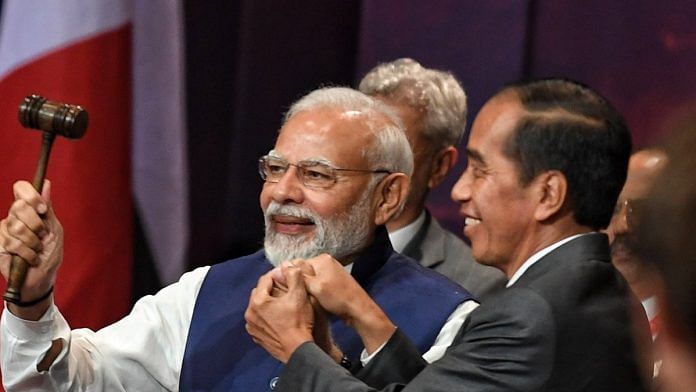New Delhi: The G-20 summit concluded Wednesday with world leaders unanimously coming down on Russia for its “aggression against Ukraine” and demanding a “complete and unconditional withdrawal” even as Prime Minister Narendra Modi committed to make the grouping “a catalyst for global change” after India was handed its presidency.
The summit in Bali saw world leaders engaging with each other, some bilaterally of which the crucial being the talks between US President Joe Biden and his Chinese counterpart Xi Jinping on Monday, the first day of the meeting.
Besides, PM Modi took the opportunity to exchange greetings with President Xi which was their first public engagement since the 2020 military standoff in Ladakh. He also met UK Prime Minister Rishi Sunak for the first time at the summit.
The fact that the G20 Summit was taking place under the backdrop of a raging war became starkly evident when Indonesian President Joko Widodo said at the last day of the Summit: “Stop the war. I repeat, stop the war … As leaders, we all have a responsibility to ensure a conducive global situation for the future.”
Addressing the media while officially closing the summit, the Indonesian President said, “The most debated paragraph is only one paragraph, which is our stance on the war in Ukraine. Until late midnight yesterday we discussed this, and in the end the Bali leaders’ declaration was agreed unanimously in consensus.”
While Russia President Vladimir Putin skipped the Summit, he was represented by Foreign Minister Sergey Lavrov.
On Tuesday even as the world leaders were engaging in the Indonesian island resort, one missile — reportedly belonging to Russia — landed in Poland, killing two near the Ukraine border. A meeting of NATO was immediately called to probe the matter. Russia vehemently denied it had anything to do with the episode.
Hinting at Russia, Ukrainian President Volodymyr Zelensky told G20 leaders Wednesday that there was a “terrorist state” among them.
‘Complete & unconditional withdrawal from Ukraine’
In a major signalling to Moscow, the Bali Declaration that got adopted with the conclusion of the Summit said the G20 “deplores in the strongest terms the aggression by the Russian Federation against Ukraine and demands its complete and unconditional withdrawal from the territory of Ukraine”.
Taking a cue from what PM Modi told President Putin at the Shanghai Cooperation Organisation (SCO) in Samarkand, Uzbekistan, the declaration said, “Today’s era must not be of war”.
“At today’s critical moment for the global economy, it is essential that the G20 undertakes tangible, precise, swift and necessary actions, using all available policy tools, to address common challenges, including through international macro policy cooperation and concrete collaborations,” it said.
Also Read: ‘India has a substantial, time-tested relationship with Russia,’ says Jaishankar in Moscow
G-20 to be ‘catalyst’ for global change, says Modi
Addressing the closing session of the summit, Modi said, “India’s G-20 presidency will be inclusive, ambitious, decisive, and action-oriented”.
“It is a proud occasion for every Indian to assume the G-20 Presidency. We will organise G-20 meetings in different cities and states of our country. Our guests will get full experience of India’s amazing diversity, inclusive traditions, and cultural richness. We wish that all of you will participate in this unique celebration in India, the ‘Mother of Democracy’. Together, we will make the G-20, a catalyst for global change,” Modi said, as he took the symbolic ‘G20 Gavel’ from Indonesian President Widodo.
India’s presidency for one year begins on 1 December.
Next year, the G20 Summit will be held in New Delhi, which means Chinese President Xi is likely to visit India even as tensions continue to prevail at the Line of Actual Control (LAC) in eastern Ladakh. China is one of the members of G20.
“India is taking charge of the G-20 at a time when the world is simultaneously grappling with geopolitical tensions, economic slowdown, rising food and energy prices, and the long-term ill-effects of the pandemic. At such a time, the world is looking at the G-20 with hope,” Modi said, without explicitly mentioning the Russia-Ukraine war.
“Without peace and security, our future generations will not be able to take advantage of economic growth or technological innovation. The G-20 has to convey a strong message in favour of peace and harmony,” he added.
Modi met Xi, Biden, Sunak in Bali
Not losing the opportunity to kickstart India’s G20 presidency, Modi held several key bilateral meetings and also exchanged greetings with Xi.
Modi and Xi greeted each other while shaking hands during a G20 dinner reception in Bali on Tuesday.
“With regard to the question relating to the handshake between the Prime Minister and President Xi Jinping, I will only say that Prime Minister Modi and President Xi Jinping who were both attending the G-20 dinner yesterday, hosted by the Indonesian President exchanged courtesies at the conclusion of the dinner,” Foreign Secretary Vinay Mohan Kwatra told a media briefing Wednesday.
In his first bilateral with UK Prime Minister Sunak, Modi discussed issues related to the proposed trade pact, which became a controversial subject under Sunak’s predecessor Liz Truss, and defence collaboration under the Indo-Pacific strategic framework.
Addressing the media in Bali, Sunak said the UK will focus on concluding all the pending trade deals it has, including the one with India by focussing on “quality and not speed”.
In his talks with the US President, Modi and Biden were also joined by Widodo while they firmed up plans for economic cooperation.
(Edited by Tony Rai)
Also Read: US calls India ‘ally’ in National Security Strategy, terms China ‘competitor & Russia ‘threat’



